Plan for the Week
TO DO THIS WEEK:
- Edit a-spec characters database and graphs - find way to visualise data about orientation and genre more clearly
- Finish reading Ending the Pursuit by Michael Paramo
- Respond to thesis feedback
- Finish writing up thematic analysis points
Happy Tutorial Tuesdays!
Last official tutorial of the year! (which I feel very relaxed about. don't even worry about it.) Got some good advice on how to structure the thesis, which is the main thing I've been struggling with.
The headlines:
- Need to integrate findings throughout thesis - summarise at beginning and signpost
- Need to change tenses in a lot of sections - esp methods section
- Highlight most important thematic analysis points and relationships between the points - which points are countering each other or backing each other up?
- It's ok to repeat key points!
- Try grouping themes together to make TA section simpler
- Bring in focus group points to TA section
- Methods section - change to methodology and include stats
- Methodology -> statistical analysis -> thematic analysis -> focus groups
- Mixed methods approach is solid! Yay!
- Try putting the methods overview at the beginning
- Try printing out thesis and rearranging pages to see what works structure-wise
- Make images and graphics bigger
- Ethics should be its own section
- Emma's on leave 29th July-2nd August but around on 5th and 6th August - if I want advice from her should email next week or 5th/6th
Thesis cutting room
Got the feedback on my draft this week, so most of the week has been responding to that - some stuff I had to cut out of the draft
I anticipate that by applying reflexive thematic analysis to the case studies in question, I will be able to identify patterns that emerge in TV portrayals of a-spec identities. Identifying these patterns will be instrumental to answering the question of to what extent these TV portrayals are influenced by stereotypes and societal assumptions.
Transcripts will be analysed using the same reflexive thematic analysis method used to analyse the TV case studies, as I will hopefully then be able to identify differences between how a-spec identities are presented in TV versus how they are presented in the focus group discussions, as well as people’s responses to the TV clips.
I anticipate that this focus group process will give me insight into how a-spec identities are understood both by those who identify as a-spec and those who do not, and the role of TV in contributing to this understanding. It should also give me insight into what are perceived to be common stereotypes about a-spec identities and whether these are perceived to be reflected in TV portrayals of these identities. I also anticipate that I will learn more about whether or not TV portrayals of a-spec identities are perceived to be “realistic” or if they are seen as distorting the reality of these orientations. Finally, I anticipate I will gain a greater understanding of the capacity of these TV portrayals to either challenge or reinforce assumptions.
Similarly, it is possible that the idea of Asian characters being asexual is seen as more acceptable because Asian people often face desexualisation and are presented as “not sexually attractive” in the media anyway (Sinwell, 2014, p.166).
Reading of the Week
Continuing to read Michael Paramo:
- "It was as if my asexual identity somehow meant that I had lost out on the possibility to achieve ‘liberation’ from the confines of the closet. This is because sex is sometimes regarded as a pathway toward achieving liberation from states of repression." (p.27) - I don't think this is even really relevant I just wanted to save it because boy can I relate to this specific frustration of Michael's
- "If liberation can only be imagined in sexual terms, where does this leave asexual people? (p.29)
- "As described by scholars Luke Brunning and Natasha McKeever, asexuality is equated in the mainstream imagination with “a pitiful existence,” meaning that when asexual people come out they may encounter “people [who] demand an explanation as to why, feel sorry for them, and hope that they change their minds so that they can experience sex.” This may be coupled with the assumption that the asexual person in question has recently ended a tumultuous relationship, that they need to keep searching until they find someone, or that they are simply fearful of relationship formation" (p.29)
- "Aromantic people endure similar accusations that coming out is conceding to a life without love or purpose in the absence of romantic relationship formation. Romantic expectations are inherently connected to sexual expectations, since romance without sex (and vice versa) is not viewed as satisfactory enough toward achieving fulfilling relationships or a healthy life. Aromantic people have identified how this presumption can originate from the (hetero)romantic expectation that women should pursue their ‘Prince Charming,’ or a man who will ‘complete’ them, and that men should, to some extent, express some interest in forming a relationship with a woman (although with far less social pressure than women)" (p.29)
- "That asexual, aromantic, and agender identities are by-products of a disability is one of the most pervasive narratives rooted in the way disabled people are perceived under cisheteropatriarchy. This has many dimensions because of the range of experiences and social assumptions pertaining to different disabilities, which can also overlap. The imposition of this narrative can include questions about hormone levels, neurodivergence, physical ability, and more." (p.35)
- "Relationship formation glued together by romance with the outcome of reproduction is upheld as an essential life pathway." amatonormativity baybeeee (p.37)
- "In an academic review of gender, race, and asexuality, the authors noted that “Black bodies are often viewed as untouchable, either promiscuous or unattractive; Asian bodies are often viewed as uniformly feminized and submissive; Brown bodies are often exoticized,” each assumption of which affects racialized asexual and aromantic people differently" (Aasha B Foster, cited p.39)
- "Deconstructing feelings of selfishness, guilt, or shame can help lessen the internalization of social pressures that emerge simply from being aro or ace in a romantic or sexual world" (p.40) - negative emotions
- "when aces and aros who are viewed as unattractive or undesirable come out, their identity may simply be viewed by others as an attempt to excuse their status as undesirable." (p.41)
- "In general, there is the misperception that aromantic and asexual identity means being totally without any feeling or emotion at all." (p.41)
- Stuff about lack of info and understanding: "As stated on AUREA, a resource hub for aromantic people, “When it comes to aromanticism you will rarely, if ever, come across people outside the LGBTQIA+ community who know what you’re talking about,” so “be prepared to explain what being aromantic means to you and have some resources handy for further reading.”" (p.42)
- "The prioritization of the sexual reveals itself in the following hypothetical: if a man were to say ‘I’m gay,’ the vast majority of people would define this as ‘he wants to have sex with men’ and not ‘he wants to be in a romantic relationship with a man that isn’t sexual’ or ‘he wants to be in a sensual relationship with a man that isn’t sexual or romantic.’ The reason this perception is overwhelmingly common is because sex is prioritized in the Western worldview as the primary manifestation of attraction. Sexual attraction is not assumed to be a mere possibility, but as inherently present." (p.46) - thought this was an interesting point, not sure I'd agree with the assertion that most people would define being gay as about having sex, to me I feel like it would be more common to say a gay man 'wants to date other men' or something like that, with more focus on the romantic? But also I suppose it really depends on who you ask.
- "Aromanticism, or the lack of romantic attraction, is more misunderstood and made invisible than asexuality because of how it expands notions of attraction beyond the sexual in its mere definition" (p.54) - more stuff about lack of understanding around aromanticism
Possible further reading:
- Aasha B. Foster et al., ‘Personal agency disavowed: Identity construction in asexual women of color,’ Psychology of Sexual Orientation and Gender
- https://affinitymagazine.us/2017/06/04/asexual-people-of-color-on-their-experiences/
Other events of the week
- Career surgery with Daniel Fountain - My career plans continue to be basically non existent but got some good advice on research opportunities - Daniel recommended Jiscmail which has research email lists you can join to see calls for papers, job listings etc. Also talked about PhD stuff - apparently a PhD is almost always necessary for teaching HE, which I did not realise lol. Also recommended that if we're interested in doing a PhD we should do research into writers/academics who could supervise our research - as mentioned my direction in life is basically non existent but I would ideally like to do a PhD at SOME point in my life. probably
- Trip to Kingston Lacy!! Lovely day out - had a great time seeing all the paintings and gardens and learning about the guy who did all the renovations on the house from "exile" in Italy!
- Continued to work on the thesis and responding to feedback! Feeling a bit overwhelmed by how much there is to do I must admit but at least I have a solid direction to go in
- Been revising my fun graphs! I've changed the orientation statistics to reflect whether ace characters are depicted as romantically attracted to the same or different genders, and I've also organised the data around genres by individual show instead of by character, so it won't be skewed by one show having multiple a-spec characters.
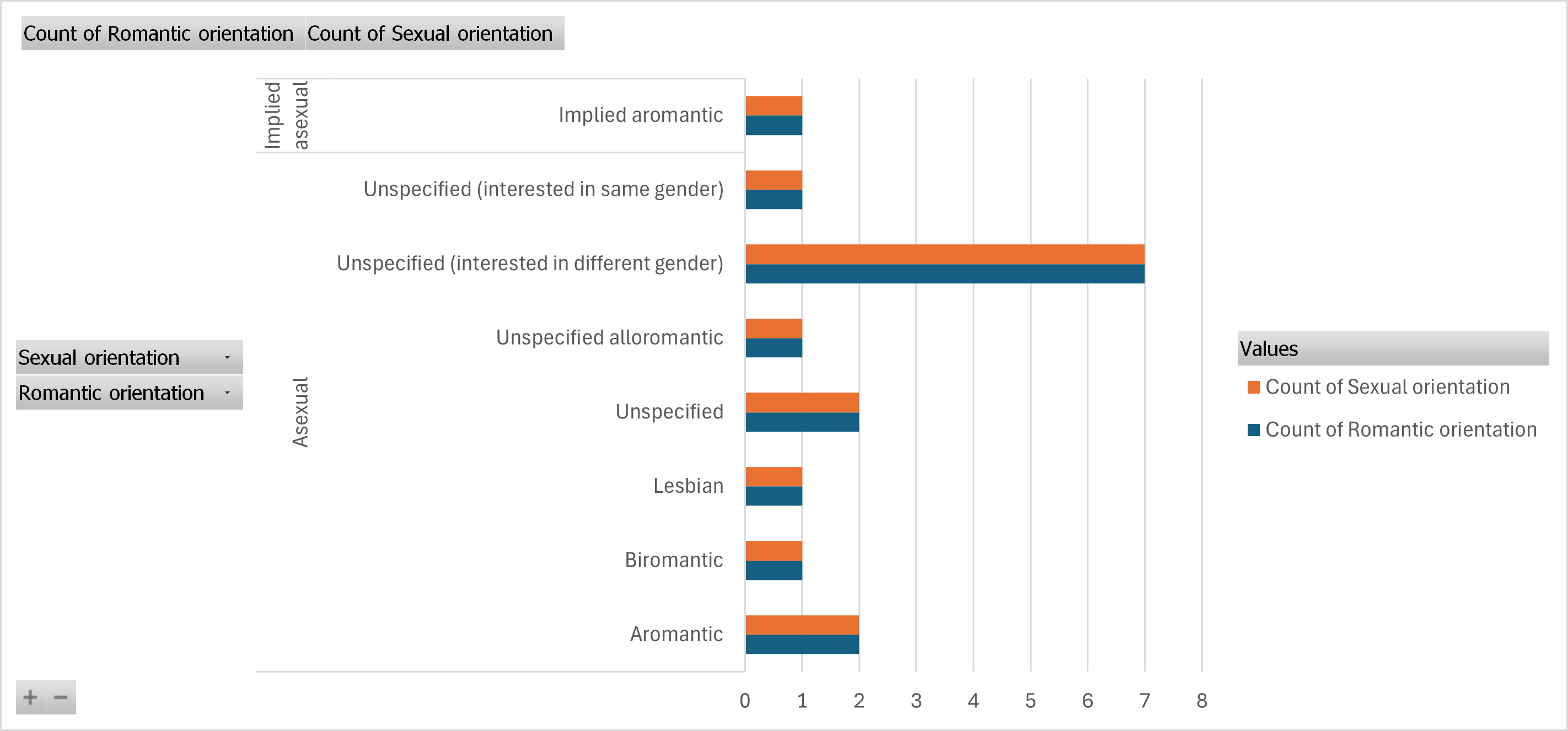
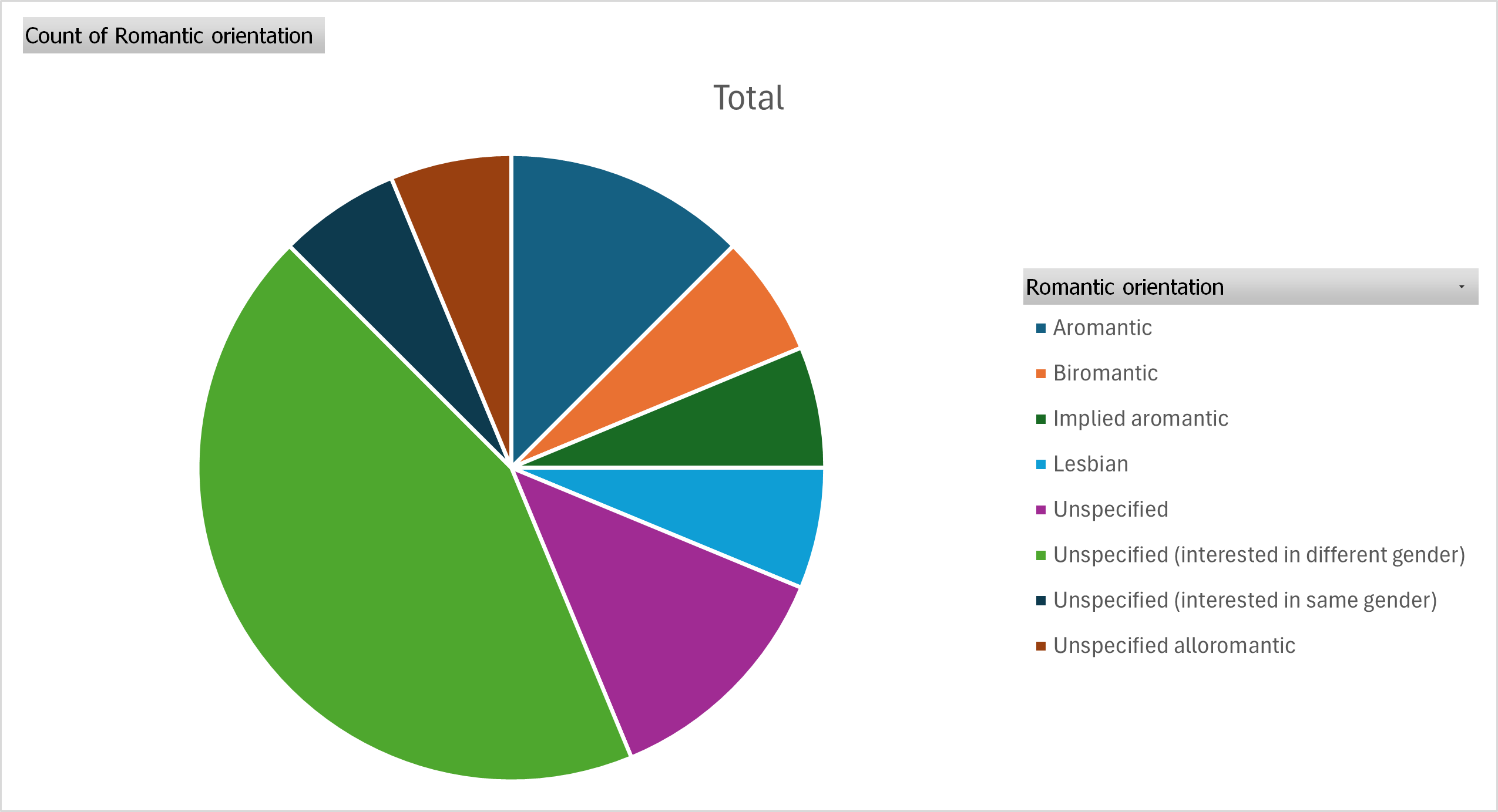
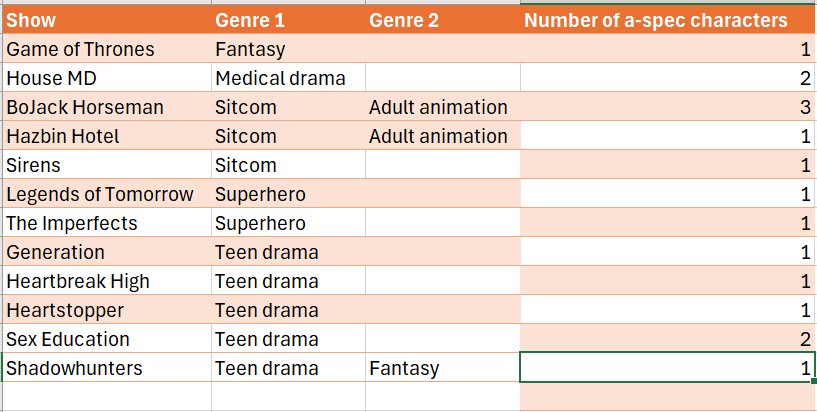
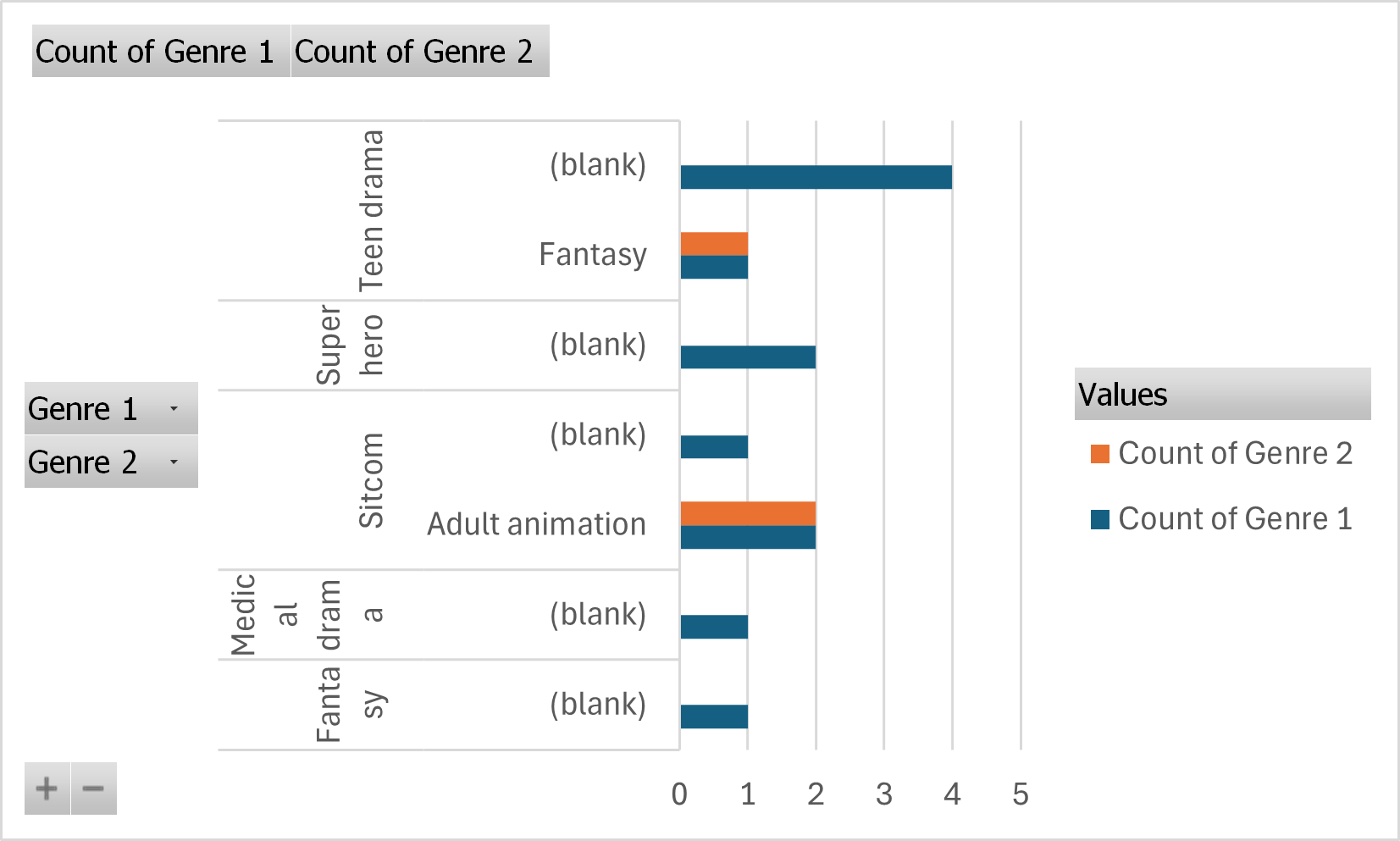
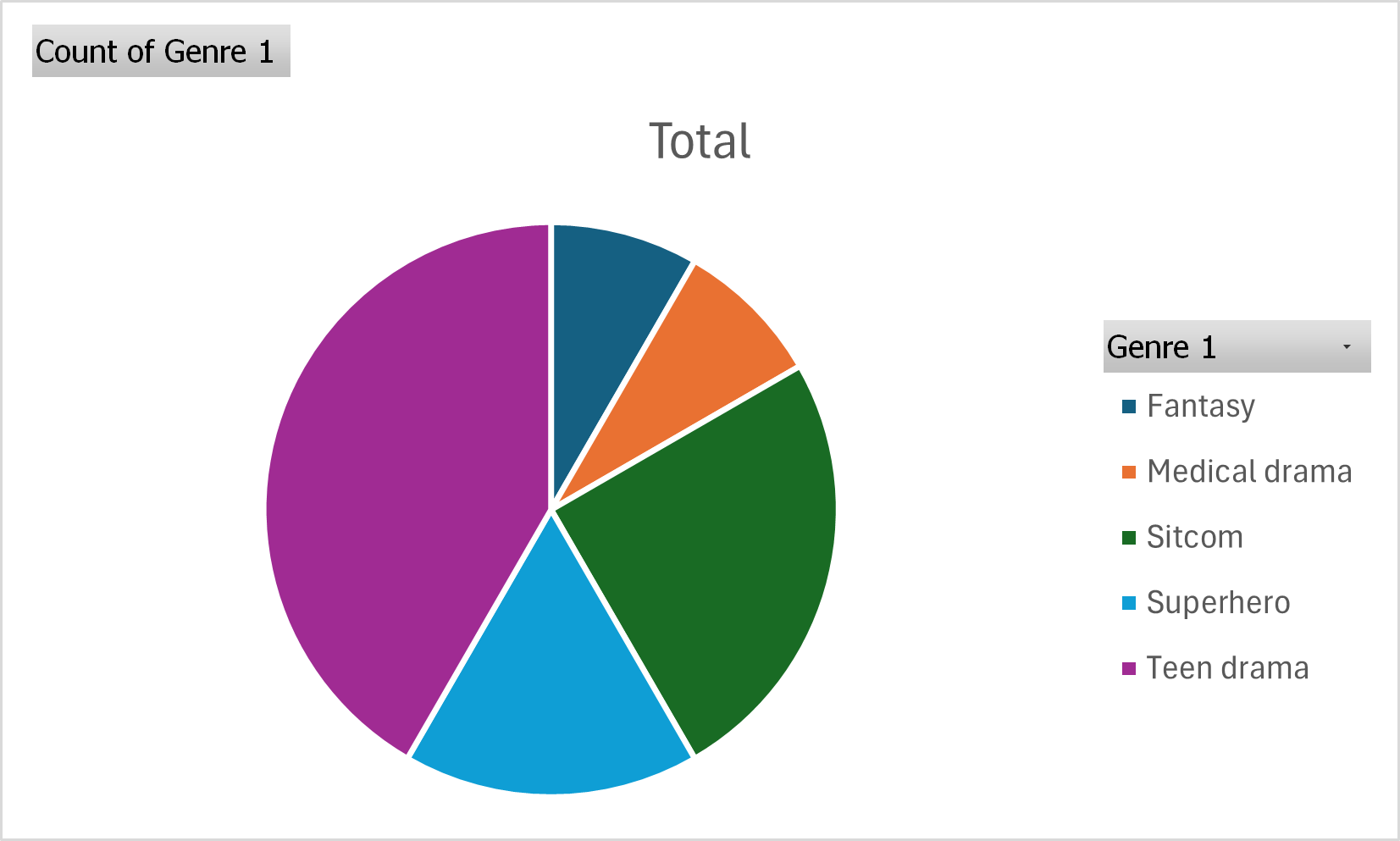
Previous week
Next week
Back to weekly journal
Back to home









